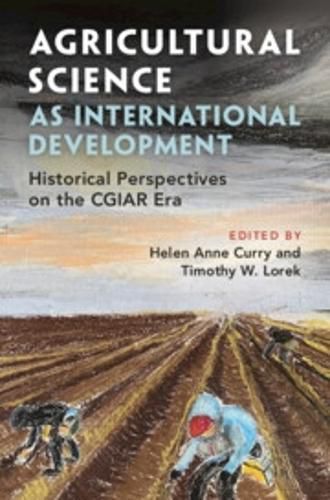Readings Newsletter
Become a Readings Member to make your shopping experience even easier.
Sign in or sign up for free!
You’re not far away from qualifying for FREE standard shipping within Australia
You’ve qualified for FREE standard shipping within Australia
The cart is loading…






This title is printed to order. This book may have been self-published. If so, we cannot guarantee the quality of the content. In the main most books will have gone through the editing process however some may not. We therefore suggest that you be aware of this before ordering this book. If in doubt check either the author or publisher’s details as we are unable to accept any returns unless they are faulty. Please contact us if you have any questions.
For more than fifty years, international aid for agricultural research has been shaped by an unusual partnership: an ad-hoc consortium of national governments, foreign aid agencies, philanthropies, United Nations agencies, and international financial institutions, known as CGIAR. Formed in 1971 following the initial celebration of the so-called Green Revolution, CGIAR was tasked with extending that apparent transformation in production to new countries and crops. In this volume, leading historians and sociologists explore the influence of CGIAR and its affiliated international research centres. Traversing five continents and five decades of scientific research, agricultural aid, and political transformation, it examines whether and how science-led development has changed the practices of farmers, researchers, and policymakers. Although its language, funding mechanisms, and decision-making have changed over time, CGIAR and its network of research centres remain powerful in shaping international development and global agriculture. This title is also available as Open Access on Cambridge Core.
$9.00 standard shipping within Australia
FREE standard shipping within Australia for orders over $100.00
Express & International shipping calculated at checkout
This title is printed to order. This book may have been self-published. If so, we cannot guarantee the quality of the content. In the main most books will have gone through the editing process however some may not. We therefore suggest that you be aware of this before ordering this book. If in doubt check either the author or publisher’s details as we are unable to accept any returns unless they are faulty. Please contact us if you have any questions.
For more than fifty years, international aid for agricultural research has been shaped by an unusual partnership: an ad-hoc consortium of national governments, foreign aid agencies, philanthropies, United Nations agencies, and international financial institutions, known as CGIAR. Formed in 1971 following the initial celebration of the so-called Green Revolution, CGIAR was tasked with extending that apparent transformation in production to new countries and crops. In this volume, leading historians and sociologists explore the influence of CGIAR and its affiliated international research centres. Traversing five continents and five decades of scientific research, agricultural aid, and political transformation, it examines whether and how science-led development has changed the practices of farmers, researchers, and policymakers. Although its language, funding mechanisms, and decision-making have changed over time, CGIAR and its network of research centres remain powerful in shaping international development and global agriculture. This title is also available as Open Access on Cambridge Core.